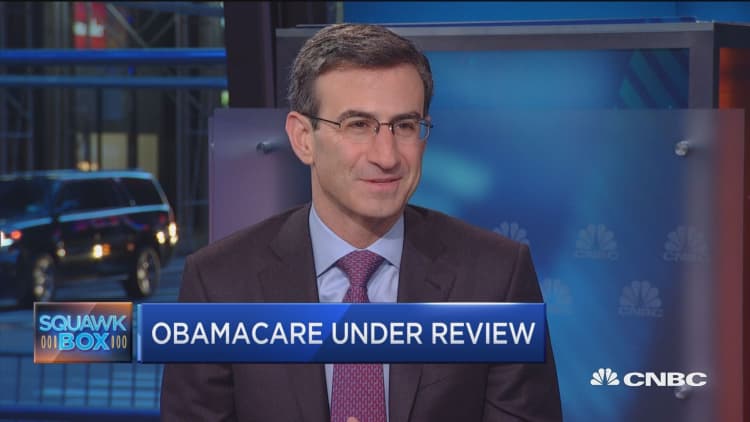
An Obamacare bell is tolling for customers — while another, louder bell may be tolling for Obamacare itself.
A key enrollment deadline for Obamacare looms Thursday, with many consumers scrambling to get health coverage that takes effect New Year's Day — for what could be the last year that the Affordable Care Act exists in its present form.
Since last Saturday, "sign-up activity has accelerated" on the federal Obamacare marketplace HealthCare.gov in anticipation of that deadline, the federal Centers for Medicare and Medicaid Services said Wednesday
"The last two days ... [Monday and Tuesday] have been the biggest two days of any open enrollment, with more than 700,000 sign-ups," CMS said in a blog post.
That tally is 17.5 percent of the more than 4 million people who have signed up on HealthCare.gov since open enrollment began Nov. 1.
This season has seen over 250,000 more sign-ups on that exchange, which serves 39 states, than what was seen during the same time period last year, CMS said.
Thursday is the last day that consumers can sign up for individual health plans, including ones sold by Obamacare exchanges, that go into effect Jan. 1 — avoiding any gaps in health coverage after the expiration of 2016 year plans. But open enrollment for 2017 plans will continue until Jan. 31.
"Compared to last year, we're seeing a surge," said Noah Lang, CEO of Stride Health, a health insurance brokerage whose individual plan clients include ride-hailing giant Uber.
"This is a critical time frame. ... In just the last 48 hours, we've seen more enrollment than we've seen in all of November."
"They could get covered for 2017, and nobody's going to take it away from them," Lang said.
"Things might change for 2018, 2019, 2020," he said, referring to plans by President-elected Donald Trump and congressional Republicans to repeal Obamacare and replace it with other legislation.
Such a "repeal and replace" could lead to significant drops in the number of Americans covered by individual health plans in future years experts have warned.
In a Facebook video posted this week, President Barack Obama and "Caddyshack" star Bill Murray engage in a golf putting competition in the Oval Office, and, amid good-natured ribbing of each other, highlight Thursday's deadline and encourage people to check out HealthCare.gov for information about how to sign up,
"Where does Michelle keep your money?" Murray quips to an exasperated Obama as he drains yet another putt.
It's a funny line — but many Democrats aren't laughing about the prospect of Obama's signature health-care reform law being undone by Trump.
Stride Health's Lang said it's not uncommon for customers this season to be asking agents questions that explicitly or implicitly reflect concerns about the impact on their insurance of Trump's election.
"The big questions are, 'What is it going to cost me, and am I going to lose that insurance? Is anyone going to take my health plan away? Am I still going to get fined if I don't buy? And is it going to cost more than last year?'" Lang said.
"I think people want to be reassured right now. Probably the No. 1 effect of the election result was uncertainty," he said.
Those people include Thomas Bos, a North Carolina Republican who voted for Trump. Bos signed up for an Obamacare health plan for 2017 sold on HealthCare.gov with the assistance of Stride Health after he quit his grocery store chain job in October and went to work as a driver for Uber.
"I think everyone should have insurance for themselves," said Bos, 45, who lives in Greensboro. "I've always been part of employer group plans, and basically this is the same scenario."
"I would be a little upset if the new administration tried to kibosh any of that," Bos said. "I expect him to look out for me."
"I think he needs to reconsider his promise," Bos said, referring to Trump's stated intention to abolish the ACA.
"I'm not asking him to renege on anything he feels he needs to do, but he needs to tailor it to the point where it's good for everybody, and not just big corporations."
At his prior job, Bos said he paid $500 per month for health insurance coverage for himself and his wife from a group plan.
Asked how much his Obamacare plan will cost him and his wife once it begins in 2017, Bos said, "It's a dollar."
Per month?
"Yep. That's all I pay."
Bos' low monthly premium reflects the value of federal tax credits that are available to him and other low- and moderate-income earners to help offset the cost of coverage purchased through Obamacare exchanges run by either the federal government or individual states.
Bos said that when he looked at the Blue Cross plan available to him and his wife on HealthCare.gov, he saw that it would cost them about $1,500 per month without any subsidy.
But when he entered their estimated 2017 income — $32,000 — on the site, it showed that they would only have to pay a single dollar every month for that coverage as a result of the subsidy they were eligible for.
""I was like, 'Hot damn!" Bos said. "It was a little bit shocking."
He noted that if his actual income ends up being higher, the value of his subsidy would decrease. But, "worst-case scenario [the premium] would only go up to $75 or $100 per month, so that's nothing compared to what they were taking out" at work, he said.
Bos signed up for his 2017 plan in November. But he said that he and his fellow drivers have been getting regular reminders from Uber's app about Thursday's deadline for signing up for coverage that goes into effect Jan. 1.


